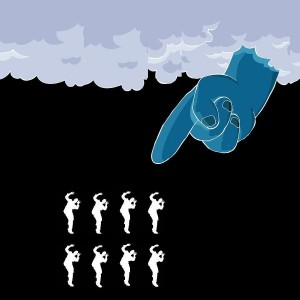How to Create Jobs, the God Way—By Command

It would seem reasonable to infer from this that as “job creators”, the same movers and shakers “didn’t create that”—“that” also designating the pool of jobs associated with the enterprises they “created”.
Note: Contains semi-satire. Proceed with a sense of humor…
If the president had voiced that idea from a pulpit and in a sermon, it might have been given an additional, even more compelling spin: “You didn’t create that (or at least not entirely on your own), because you were created by an almighty Creator (who truly deserves the credit)”. But his speech was (about) economics and politics, not theology. Nonetheless, giving it a theological tinge may actually illuminate both the limits of his remarks and, as will be shown, a possible process of job creation.
Self-Created Self, Self-Created Universe and Self-Created Jobs
Suppose that jobs were to be created by God—of course, without any “help” or dependency on another creator (as “co-creator”, creator of God, or creator of those creators, ad infinitum). No, the Ultimate Job Creator would not only create all the infrastructure and natural resources the created jobs require, plus the workers to do those jobs, but would also create himself—or simply be, eternally and uncreated, with no “assistance”, “collaboration” or other interdependence of any kind, especially of the kind the president was alluding to.
In the real world of business and economics, “self-made” man is a metaphor suggesting self-creation of one’s wealth and other success. In theology, “self-made” (“causa sui “, characterizing God and gods), is accepted literally, even if utterly incomprehensibly, as “self-creation” (of oneself by oneself).
(In contrast to this, some theologians have argued that God can neither be externally caused nor self-caused, since a perfect being is not susceptible to any change whatsoever, That leaves “uncaused”, which, nonetheless, is still a form of complete self-sufficiency and independence.)
Hence, as job creator, God would not only create everything a business requires, including the workers, their natural resources and their willingness to work, but also Himself. (Now that’s complete independence!)
Moreover, God, being self-created is also self-employed, the universe being evidence of his “work” and the Seventh Day of “rest” his additional self-reward (the first being that, upon viewing the fruit of his labor, He “saw that it was good ”). (Why any omnipotent being would ever have to rest remains as mysterious as the rest of the story.)
However, in the real world, dependency, interdependency and/or co-creation are not only the norm, but also the necessaries of creation of tangible wealth, goods, services and jobs (for even Robinson Crusoe had to depend on the availability of resources that he did not create to fashion any tool or to create any product of a tool).
But for job creation the God way, none of that would be necessary: no dependency on co-creators taking co-credit, no dependency on resources that One has not created, no dependency on any influences that created the drive or capacities to create a business and jobs.
Not even cooperation of created workers would be necessary, since, being omniscient as well as omnipotent, God knows that the compulsions He arranges to get people to work will be effective. After all, what were Adam and Eve condemned to for their disobedience?—eternal toil, i.e., work (with the exercise of their free will providing no escape for their descendants and mankind as a descendant and descending whole).
That was the point God made when he thundered at the hapless couple, “Cursed is the ground because of you; through painful toil you will eat food from it all the days of your life (with the understanding that this toil curse will be hereditary).”
That model is not job creation through (co)dependency or cooperation. It’s not even based on submission, since the only choice afforded is work, starve or sin, e.g., theft or fraud, to inevitably be “worked off” in Hell—which only postpones the work commanded.
So, who or what in the real world of business could operate that way—to create jobs with absolutely no dependency on anyone or anything, and to therefore deserve full credit for creating them?
Answer: a tyrant.
Command, through pre-existing power over or respect of those commanded that they go to work, could create and sustain jobs. I have from time to time imagined such a draconian solution to recessions and depressions: Simply order everyone back to work, set interest rates and exchange rates by decree, etc. To ensure that succeeds, it will also be necessary to order everyone to shop, spend and invest—and at previous or higher levels, with dire consequences for failure to comply.
Rephrasing FDR
This dictatorial approach to job creation can be encapsulated in a variation of FDR’s memorable pronouncement that “the only thing we have to fear is fear itself”: “You have nothing to fear but me and starvation”.
Doingthe jobs would, of course, be dependent on resources, infrastructure, etc. But creating them would not. Obedience and fear would suffice, given adequate, i.e., irresistible threats of punishment or promises of reward.
As a blueprint for job creation it could work. It would merely need to be laid out in detail—perhaps in a handbook.
Say, The Book of Jobs.

